Unprecedented numbers of sick medical staff are causing gridlock in hospitals across San Diego County, significantly hampering efforts to efficiently treat the large number of residents coming forward for care amid continuing increases in the number who are testing positive for the COVID-19 coronavirus.
The county health department reported 7,786 new positive cases Jan. 4, down from the previous day’s total of 8,313. Many of those positive test results, though, have been for health care workers, the people the community needs most to make it through the current coronavirus surge.
Chris Van Gorder, chief executive of Scripps Health, said in an email that an unprecedented 14.5 percent of the health system’s workforce — about 700 workers, including more than 400 in clinical roles — were out on unscheduled time off as of the afternoon of Jan. 4.
“I never like to use the word ‘crisis,’ but I’ve never seen a staffing issue this serious before, even last year when COVID admissions were much higher,” Van Gorder said. “We just passed the holidays; it’s bound to get worse before it starts to get better.”
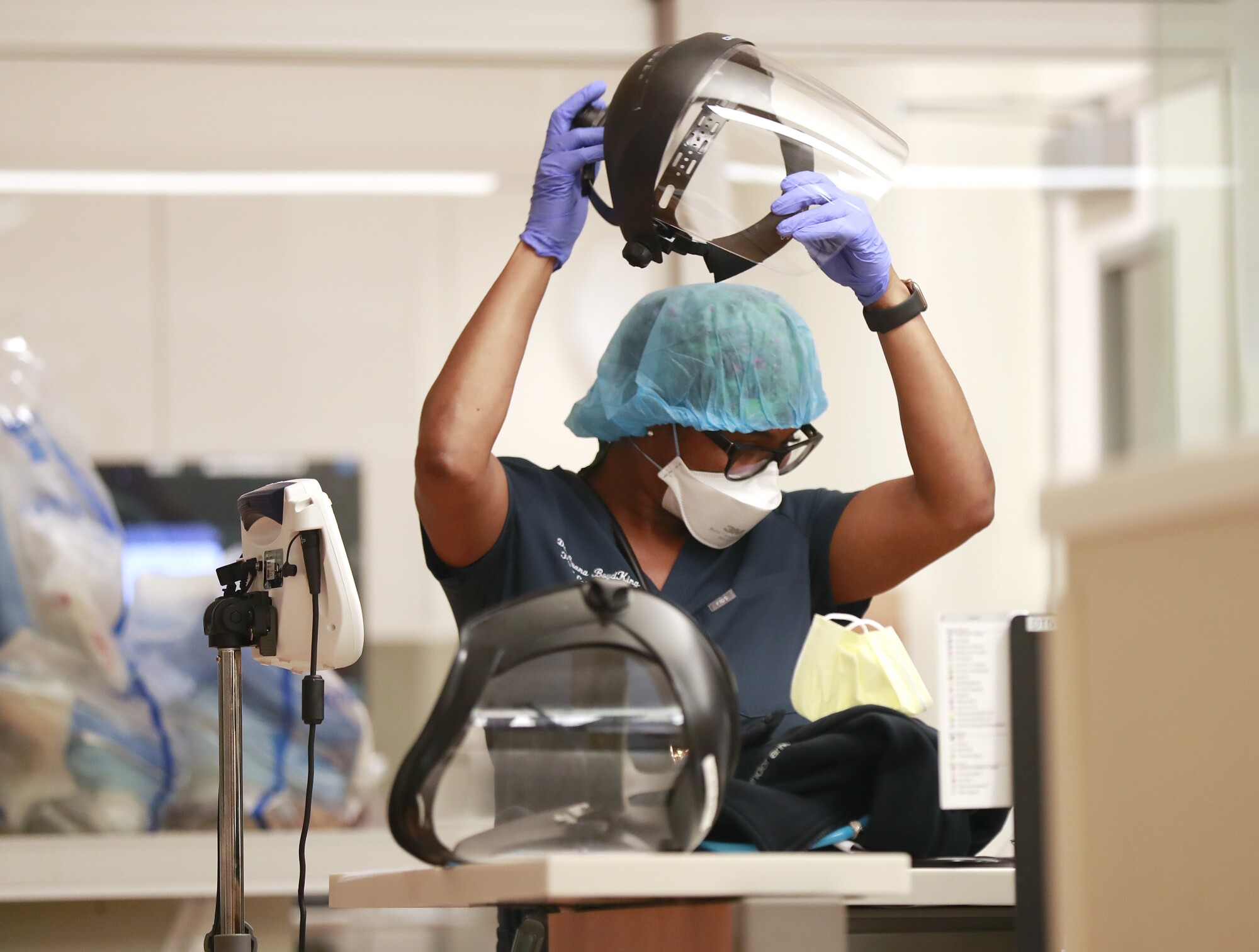
Ayana BoydKing, a pulmonology critical care doctor, takes off a face shield after seeing a COVID-19 patient in a negative pressure room in the emergency room at Scripps Memorial Hospital La Jolla on Jan. 3.
Patricia Maysent, chief executive of UC San Diego Health, said more than 500 health care workers in the La Jolla university’s system had tested positive over the past seven days, a number that forced some departments to operate at as little as half capacity.
“This is the first time, from the very beginning of the COVID pandemic, that I’m actually worried that we don’t have enough staff to take care of the patients,” Maysent said.
The staffing situation was easily visible the night of Jan. 3 at Scripps Memorial Hospital La Jolla.
At about 9 p.m., Dr. Eric Barroso scrutinized the list of patients filling the facility’s 47 emergency beds, noting with frustration that 25 were marked with a light purple color, signifying they were ready to be admitted to the main hospital.
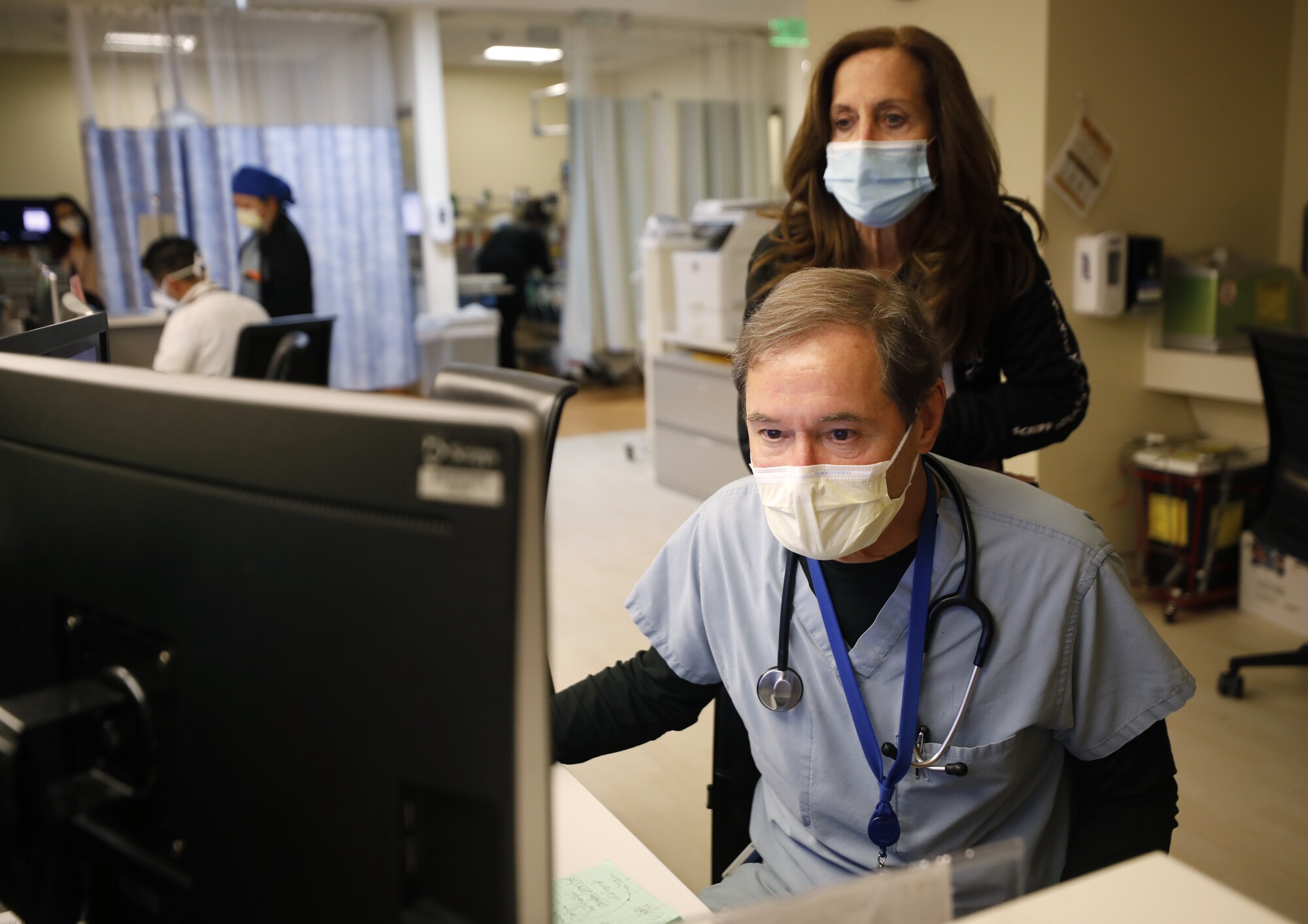
Dr. Martin Griglak and Kim Roberts, senior director of clinical services at Scripps Health, look over patient loads in the emergency room at Scripps Memorial Hospital La Jolla.
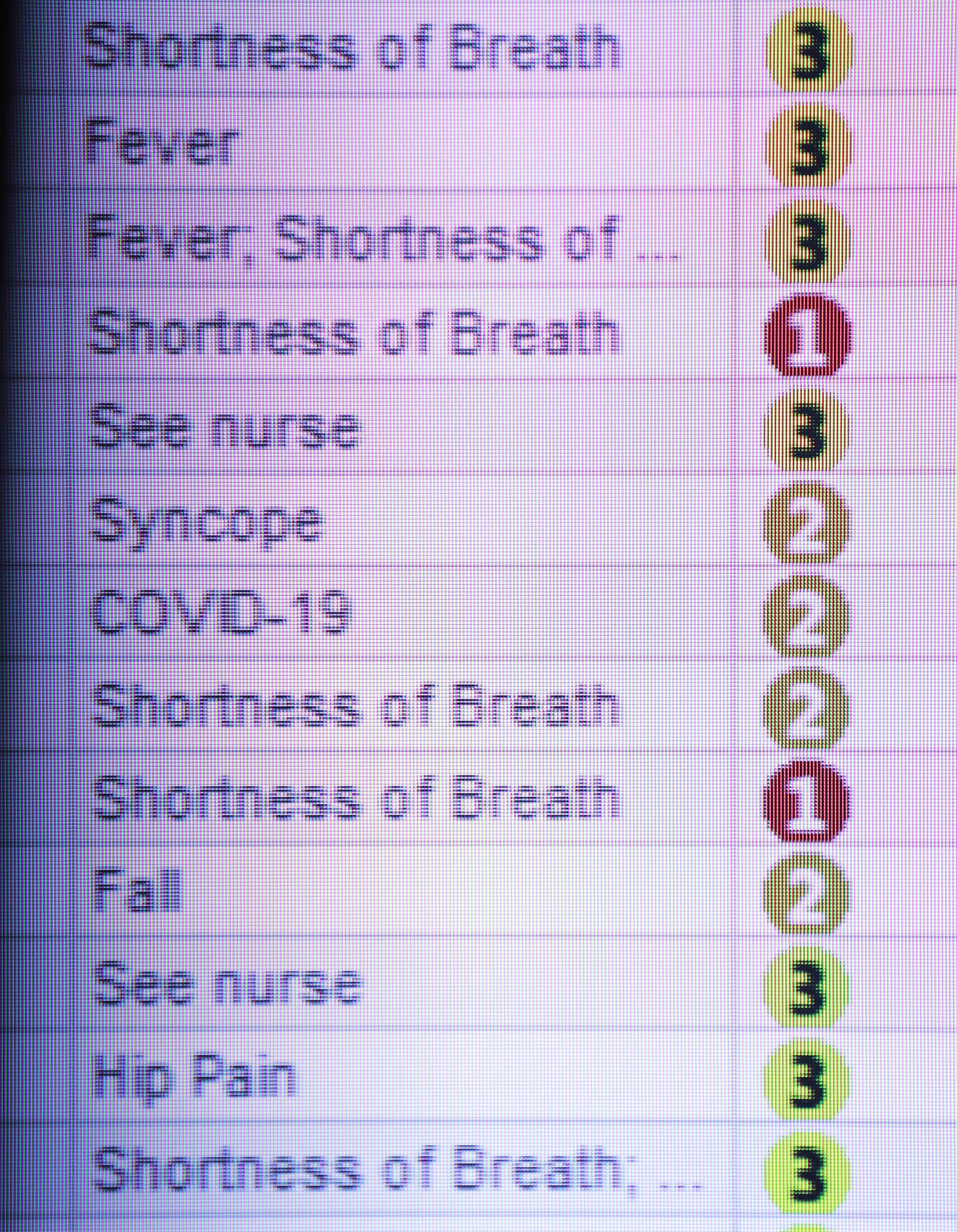
A monitor shows the symptoms of patients in the emergency room at Scripps Memorial Hospital La Jolla on Jan. 3.
He described the helpless feeling that comes from having 30 or 40 patients in the waiting room while so many were ready but unable to move along.
“Those are the patients that have already been admitted to the hospital that shouldn’t be down here anymore, and that’s half of our ER,” Barroso said.
It wasn’t that no beds were available for them, said Dr. Martin Griglak, one of Barroso’s emergency medicine colleagues. Too many health care workers called in sick after testing positive for the coronavirus, significantly reducing the number of beds in the main hospital with staffing available, he said.
The usual methods of freeing up space were not working well. Health care is a tightly integrated chain of specialized personnel designed to keep patients moving. But at the moment, staffing difficulties are eroding capacity at every level.
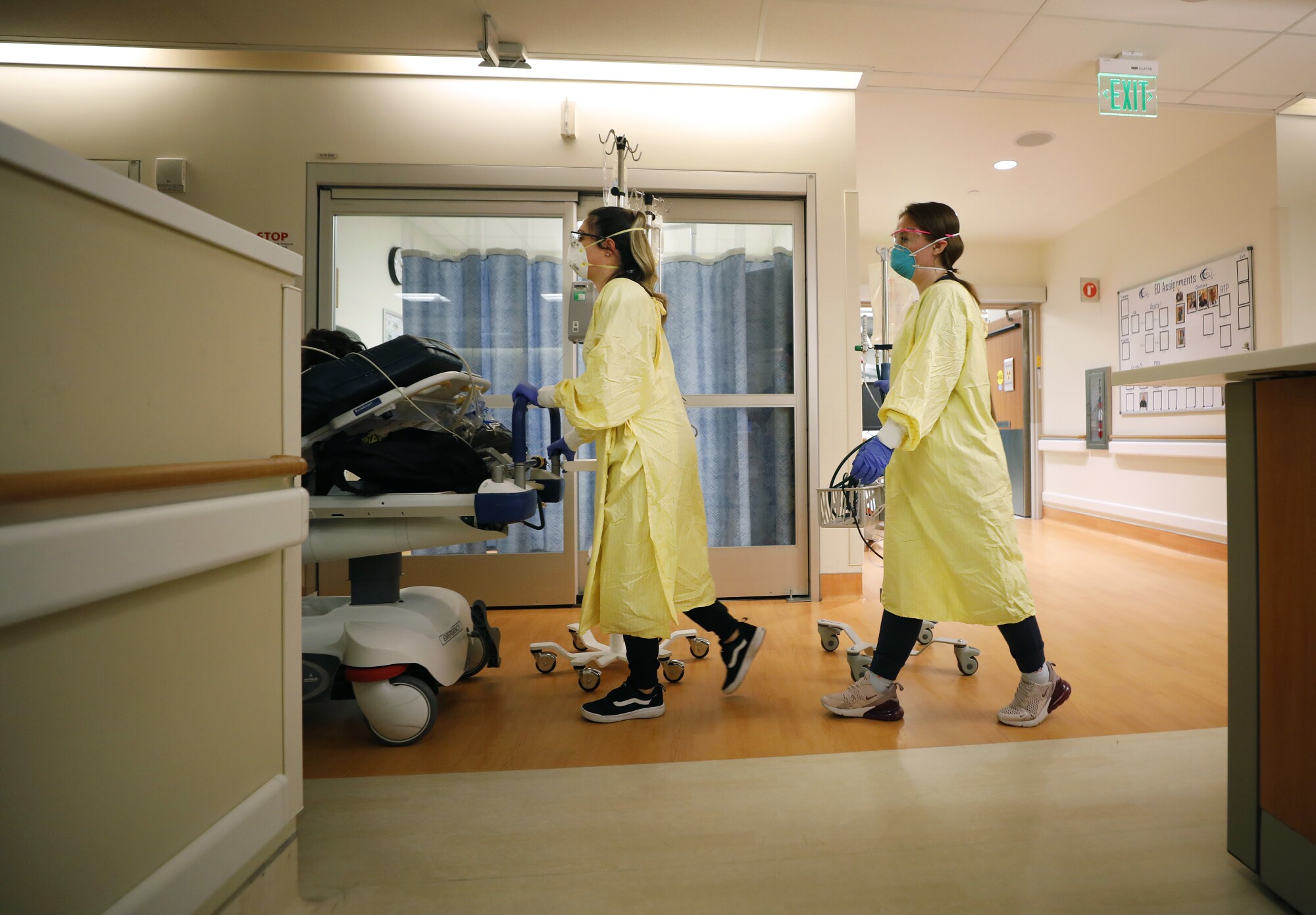
Registered nurse Nicole Brunner (left) and respiratory therapist Amanda Navarro wheel a COVID-19 patient from the emergency room to the intensive care unit at Scripps Memorial Hospital La Jolla.
“It all has a domino effect,” Griglak said. “We talk to hospital administration about trying to discharge some of the patients who are ready to go to skilled nursing, but there are not beds there either.”
Scripps Health said its hospitals are increasingly rescheduling non-emergency surgeries and procedures and UC San Diego Health and Sharp HealthCare said they are taking similar measures to cope with the loss of staff to illness.
Like Scripps, Maysent said low staffing numbers have forced UCSD to pull back on scheduled surgeries and procedures, with 27 operating room bookings delayed this week and potentially many more to come if the numbers on sick leave continue to mount as expected.
Last year, hospitals were under public health orders to put off as many non-emergency procedures as possible to make room for COVID-19 cases. That move ended up creating a massive backlog of work that many in health care say is one of the main reasons the demand for non-COVID care was so high in 2021. Having similar delays occur again this year has the potential to put health care in catch-up mode for another year, many are saying.
“It really hurts to be in that position again,” Maysent said.
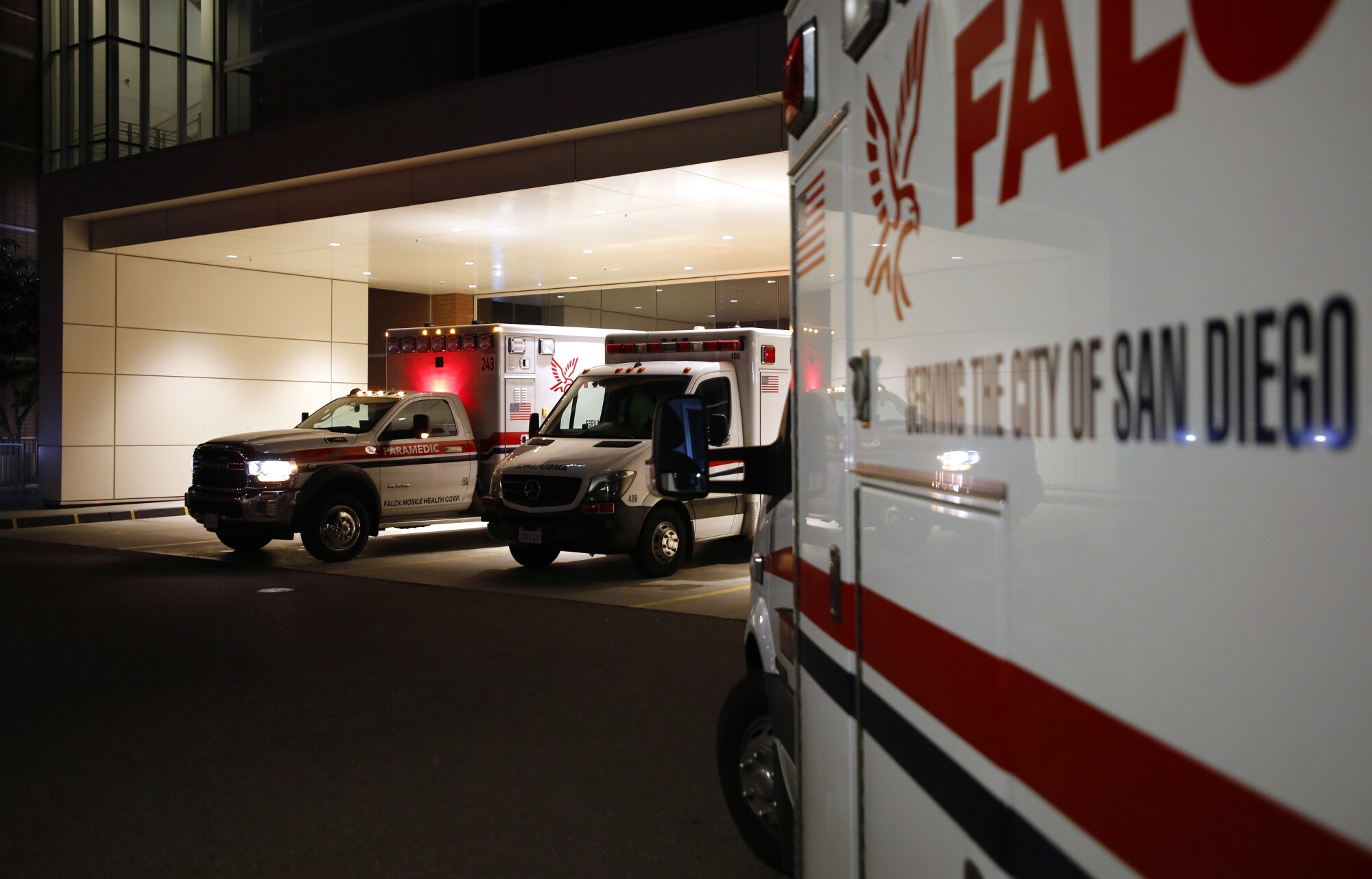
Ambulances line up at the emergency room at Scripps Memorial Hospital La Jolla.
What happens if staffing levels keep degrading substantially?
Hospitals have disaster plans that allow them to ask for additional help from the government. One lever left to pull, Maysent said, involves shifting non-hospital care to telemedicine as much as possible and pulling internal medicine workers into hospitals to help fill empty spots. Many facilities did just that last winter, though the reason was due to a massive number of very sick COVID-19 patients requiring care rather than the sick workforce that is currently snarling the health care system.
Hospital workers continue to say that severe COVID-19 symptoms are most often appearing in those who are unvaccinated. Many have expressed a lack of concern about COVID-19, especially as preliminary reports have indicated that those infected with the new Omicron variant seem to have less-severe symptoms than have been caused by other variants.
While most of the patients in the ER waiting room Jan. 3 at Scripps La Jolla had relatively mild symptoms, several beds were filled with patients who came in with very low oxygen levels, eventually needing admission to intensive care.
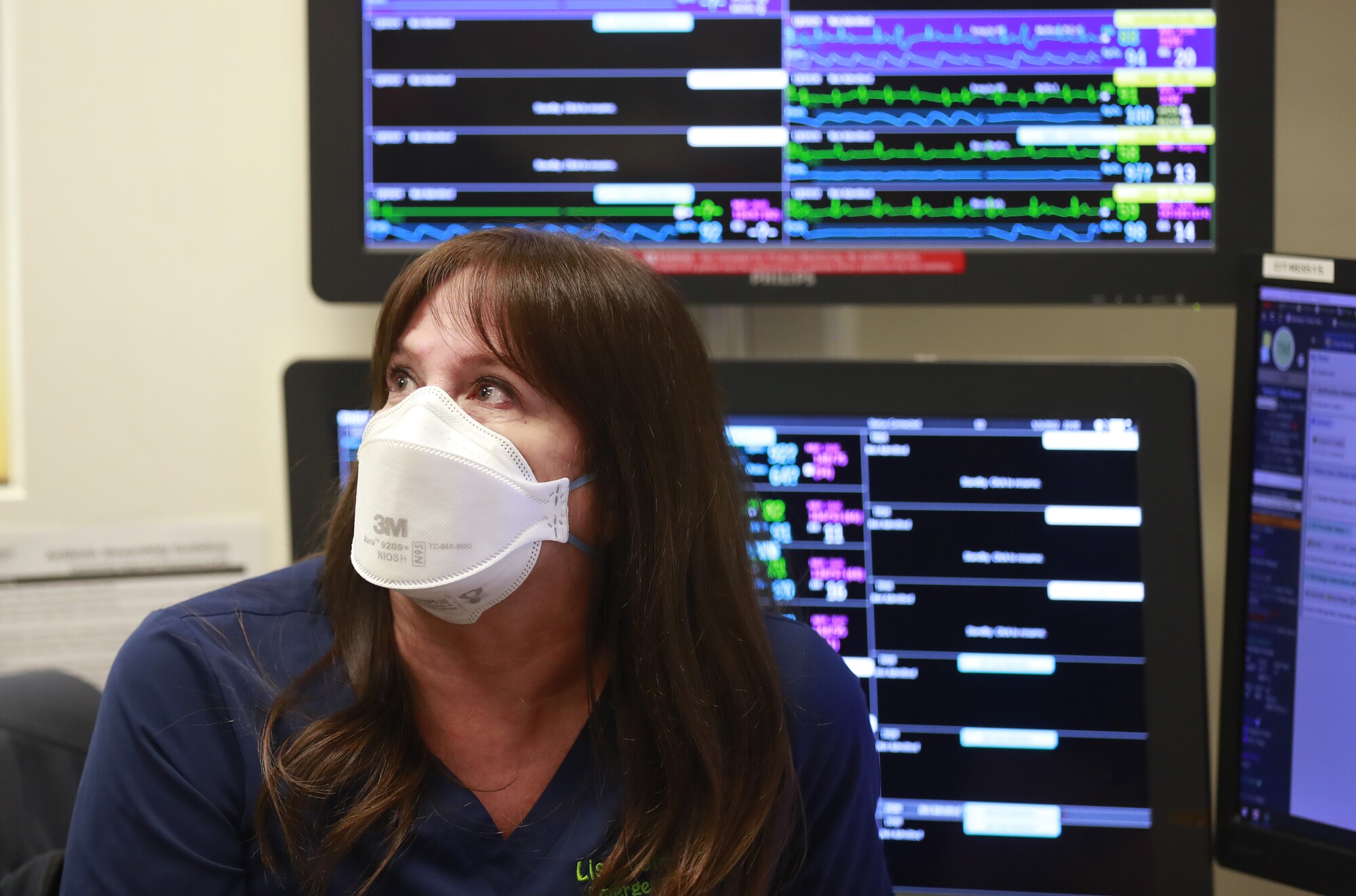
Dr. Lisa Morikado works in the Scripps La Jolla emergency room Jan. 3.
Dr. Lisa Morikado, an emergency medicine specialist, said it’s hardest seeing serious consequences among those who have chosen not to increase their chances of a mild case by getting vaccinated.
She recalled a recent 62-year-old patient who decided he would do better getting infected than getting the vaccine. He got out of the intensive care unit three weeks ago after nearly losing his bout with the disease and likely will never work again.
“He was intubated and had two strokes, his kidneys failed, and that’s the catch; you do well unless you don’t,” Morikado said. “There’s nothing we can tell you.” ◆
"care" - Google News
January 06, 2022 at 12:27AM
https://ift.tt/3eQgszQ
High number of sick health care workers puts squeeze on hospitals, including in La Jolla - La Jolla Light
"care" - Google News
https://ift.tt/2N6arSB
Shoes Man Tutorial
Pos News Update
Meme Update
Korean Entertainment News
Japan News Update
Bagikan Berita Ini














0 Response to "High number of sick health care workers puts squeeze on hospitals, including in La Jolla - La Jolla Light"
Post a Comment